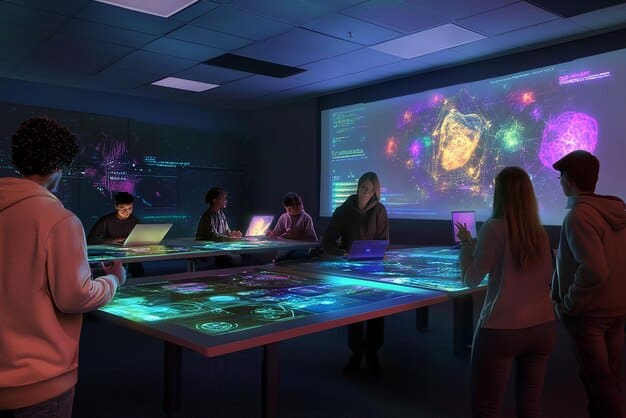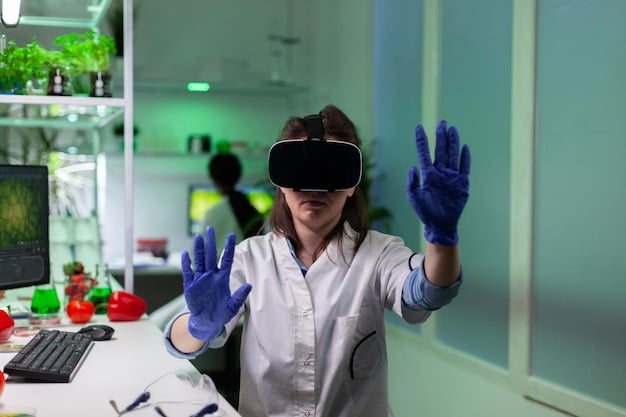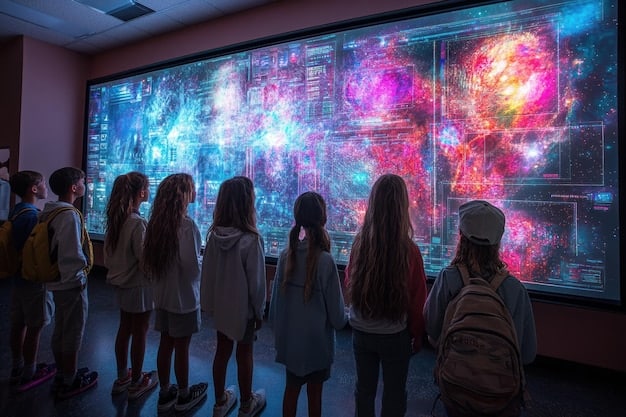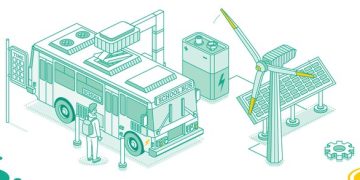The Future of Higher Education: Online and Hybrid Models to Dominate by 2030

Experts predict that the future of higher education will see a significant shift towards online and hybrid learning models by 2030, driven by technological advancements and changing student needs. These models offer increased accessibility, flexibility, and personalized learning experiences.
The landscape of higher education is undergoing a rapid transformation. As we approach 2030, many experts believe that the traditional model of in-person learning will be significantly altered. Get ready to explore the future of higher education: Experts predict a shift towards online and hybrid learning models by 2030.
What will this future look like, and what impact will it have on students, faculty, and institutions? Let’s dive into the predictions and explore the key trends shaping the educational landscape. With increasing access to technology and a growing demand for flexible learning options, the shift towards online and hybrid models seems inevitable in the future of higher education: Experts predict a shift towards online and hybrid learning models by 2030.
The Rise of Online Learning Platforms
Online learning platforms have become increasingly sophisticated and accessible, providing a robust alternative to traditional classroom instruction. This trend is driven by advancements in technology and a growing demand for flexible learning options.
Accessibility and Convenience
One of the primary drivers of online learning’s popularity is its accessibility. Students can access course materials and lectures from anywhere in the world, at any time that suits their schedule. This is particularly beneficial for students with work or family commitments.
Cost-Effectiveness
Online education can also be more cost-effective than traditional schooling. With lower overhead costs for institutions and reduced expenses for students (such as commuting and on-campus housing), online programs often present a more affordable option.
- Reduced tuition fees due to lower operational costs.
- Elimination of commuting expenses, saving time and money.
- Access to a wider range of courses and programs regardless of location.
- Self-paced learning, allowing students to balance education with other responsibilities.
As technology continues to advance, online learning platforms will likely become even more immersive and engaging. Virtual reality (VR) and augmented reality (AR) could be integrated to provide students with hands-on learning experiences, regardless of their physical location. The discussion around the future of higher education: Experts predict a shift towards online and hybrid learning models by 2030 has ignited debates about quality and effectiveness, however, these platforms continually evolve to address these concerns.

Hybrid Learning: The Best of Both Worlds
Hybrid learning models, which combine online and in-person instruction, are gaining traction as a way to leverage the benefits of both formats. This approach offers students the flexibility of online learning while still providing opportunities for face-to-face interaction and collaboration.
Personalized Learning Experiences
Hybrid models allow instructors to tailor their teaching methods to meet the needs of individual students. Online components can be used for self-paced learning and assessment, while in-person sessions can focus on collaborative projects and discussions.
Enhanced Engagement
By incorporating both online and in-person elements, hybrid learning can create a more engaging and dynamic learning environment. Students can participate in online forums, watch video lectures, and then come together in person to discuss and apply what they have learned. This blended approach is a vital component of the future of higher education: Experts predict a shift towards online and hybrid learning models by 2030.
- Flexibility to choose between online and in-person sessions based on personal needs.
- Opportunities for collaborative projects and discussions with peers.
- Personalized feedback and support from instructors.
- Access to a wider range of resources and learning materials.
The integration of technology is critical to the success of hybrid learning. Institutions need to invest in the infrastructure and resources required to support online learning, such as high-speed internet access and robust learning management systems (LMS). Also, instructor training on effective use of technology in education is paramount for the future of higher education: Experts predict a shift towards online and hybrid learning models by 2030.
The Role of Technology in Transforming Education
Technology is at the heart of the transformation occurring in higher education. From online learning platforms to virtual reality experiences, technology is enabling new and innovative ways of teaching and learning.
Artificial Intelligence (AI)
AI is poised to play a significant role in personalizing education. AI-powered tools can analyze student data to identify learning gaps and provide targeted support. Chatbots can answer student questions and provide guidance, freeing up instructors to focus on more complex tasks.
Blockchain Technology
Blockchain technology can be used to create secure and verifiable digital credentials. This could simplify the process of verifying academic records and transcripts, making it easier for students to transfer credits and for employers to assess qualifications. All these innovations are key elements in the future of higher education: Experts predict a shift towards online and hybrid learning models by 2030.
- AI-driven personalized learning experiences.
- Blockchain-verified digital credentials for simplified academic record verification.
- Data analytics to identify student needs and improve teaching methods.
- Virtual and augmented reality for immersive simulations.

Institutions must embrace technology and invest in the resources needed to support its integration into the curriculum. This includes providing instructors with training on how to use new technologies effectively and ensuring that students have access to the technology they need to succeed. The promise of artificial intelligence is a central aspect of the future of higher education: Experts predict a shift towards online and hybrid learning models by 2030.
Challenges and Opportunities in the New Educational Landscape
While the shift towards online and hybrid learning offers many benefits, it also presents challenges that need to be addressed. Ensuring equitable access to technology, maintaining quality standards, and providing adequate support for students are all critical considerations.
Digital Divide
One of the biggest challenges is the digital divide. Not all students have access to reliable internet and the technology devices needed to participate in online learning. Institutions need to address this issue by providing resources such as laptops and internet hotspots.
Maintaining Quality Standards
As more courses and programs move online, it is essential to maintain quality standards. Institutions need to develop rigorous assessment methods to ensure that students are learning the material effectively. Instructor training and support are also crucial to maintaining quality in online instruction. Addressing these challenges is paramount in discussions about the future of higher education: Experts predict a shift towards online and hybrid learning models by 2030.
- Addressing the digital divide to ensure equitable access to technology.
- Maintaining rigorous quality standards in online and hybrid programs.
- Providing adequate support and resources for online learners.
- Adapting to the changing needs and expectations of students.
The shift towards online and hybrid learning models also presents opportunities for institutions to reach new student populations. Online programs can attract students from around the world, increasing diversity and expanding the institution’s reach. Partnerships with industry can also provide students with valuable real-world experience and career opportunities. To succeed in the future of higher education: Experts predict a shift towards online and hybrid learning models by 2030, institutions will need to be flexible, innovative, and responsive to the needs of their students.
Preparing for the Future of Higher Education
To thrive in the evolving landscape of higher education, students, faculty, and institutions need to be prepared for the changes ahead. This includes developing new skills, adopting new teaching methods, and investing in the technology and infrastructure needed to support online and hybrid learning from the future of higher education: Experts predict a shift towards online and hybrid learning models by 2030.
Developing Digital Literacy
Students need to develop strong digital literacy skills to succeed in online and hybrid learning environments. This includes being able to use online learning platforms, collaborate with peers online, and critically evaluate information found online.
Adopting New Teaching Methods
Instructors need to adopt new teaching methods that are effective in online and hybrid environments. This includes creating engaging online content, facilitating online discussions, and providing personalized feedback to students. Understanding the importance of continuous learning and adaptation for the future of higher education: Experts predict a shift towards online and hybrid learning models by 2030 is critical to long-term success.
- Prioritizing digital literacy skills for students.
- Adopting effective online and hybrid teaching methods for instructors.
- Investing in technology and infrastructure to support online learning.
- Fostering a culture of innovation and continuous improvement.
Ultimately, the future of higher education will be shaped by the choices we make today. By embracing technology, prioritizing student needs, and fostering a culture of innovation, we can create a higher education system that is more accessible, affordable, and effective. It’s a future full of potential for the future of higher education: Experts predict a shift towards online and hybrid learning models by 2030 as learners have access to education across the globe.
| Key Point | Brief Description |
|---|---|
| 💻 Online Learning | Offers flexibility and broadens access to educational resources. |
| 🤝 Hybrid Models | Combines online convenience with face-to-face interactions. |
| 🤖 Technology | AI personalizes learning, blockchain verifies credentials. |
| 🌐 Access | Addressing the digital divide is crucial for equitable education. |
Frequently Asked Questions
Experts predict a significant increase in online and hybrid learning, driven by technology and student demand for flexibility. These changes aim to make education more accessible and personalized.
Online learning offers increased flexibility, cost-effectiveness, and accessibility. Students can learn at their own pace and access resources from anywhere in the world, which suits varied schedules and commitments.
Technology, including AI and blockchain, will personalize learning and secure academic credentials. Innovations like VR and AR will provide immersive experiences, enhancing educational outcomes for the learners around the world.
A hybrid learning model combines online and in-person instruction, offering the benefits of both formats. It allows for personalized learning experiences and enhanced engagement, providing students with varied skills.
Addressing the digital divide involves providing resources like laptops and internet access to ensure equitable participation for all students. Closing this gap is crucial when considering the future of higher education: Experts predict a shift towards online and hybrid learning models by 2030.
Conclusion
As we look towards 2030, it’s clear that higher education will undergo significant changes. The rise of online and hybrid learning models, driven by technology and student demand, will transform the way education is delivered and accessed. Navigating these changes and embracing innovation is vital to unlocking the future of higher education: Experts predict a shift towards online and hybrid learning models by 2030.
By addressing the challenges and embracing the opportunities, we can create a higher education system that is more accessible, affordable, and effective. This proactive approach to transforming the traditional education model will give learners the skills they need to succeed in a rapidly changing world.





